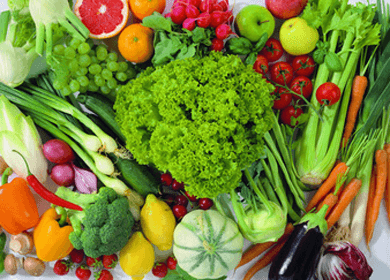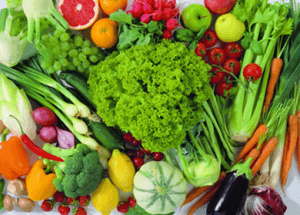
Scientists know that plants possess thousands of bioactive compounds, called phytochemicals, that impart health benefits when we eat them. These benefits range from protection of the eye against age-related macular degeneration to preventing the damaging effects of atherosclerosis that leads to heart disease. In fact, scientists believe that phytochemicals might be partially responsible for the excellent health typically seen among people who eat large amounts of plant foods.
 Plants’ survival system
Plants’ survival system
Over thousands of years, plants have developed powerful protective defense systems. In fact, the oldest living objects on earth are plants, specifically trees. “Plants can’t just get up and run away from harmful predators or insults or injuries, such as sunshine and insects. So, plants developed compounds (phytochemicals) to protect themselves,” reported Navindra Seeram, Ph.D., botanical researcher and Assistant Professor of Pharmacognosy at the University of Rhode Island, at the Berry Health Benefits Symposium at Westlake Village, CA on June 27, 2011. Many of these phytochemicals are pigments concentrated in the plant peel that are responsible for their vibrant hue—from the deep blue of blueberries to the rich red of tomatoes.
This complex defense system also works to ensure the plants’ propagation. For example, “Plants makes berries colorful to attract seed dispersants,” says Seeram, who has studied the habits of migratory birds off the Northeast coast of the U.S. Before they start their long journey south for the winter, the birds switch from their insect diet to a berry diet, consuming three to four times their body weight in berries. These birds, who can see color the same as humans do, select the darkest berries that are highest in plant pigments over the lighter colored ones. Seeram believes that this high consumption of berries offers the birds health protection before their stressful migration. When the birds consume the berries, they expel the seeds over a wide area and promote the survival of the plant—a mutually beneficial relationship.
Humans + plants = health
Phytochemicals are not classified as nutrients as are, for example, vitamin C and iron, which have been established as essential for human health. Yet phytochemicals appear to provide benefits beyond the mere maintenance of normal health. “Phytochemicals are compounds, just like Advil is a compound. The plants go through secondary metabolism [during which plants themselves produce the phytochemicals],” explains Seeram.
Like birds, humans evolved with plants and developed a long, beneficial relationship with them. “In tropical Africa, man wandered over large areas and ate over 800 varieties of plant foods, providing 25,000 different phytochemicals,” Seeram adds.
Phytochemical science
When phytochemical research took off a couple of decades ago, the emphasis was on total antioxidant capacity, as measured in a test tube. This resulted in a race to see which plant food—from blueberries to walnuts to coffee—contained the highest levels of antioxidants.
Seeram reports, “Researchers got into a big fight over who discovered bigger antioxidant levels than the other.” However, while antioxidants are important—they counteract the damaging effects of oxidative stress that can lead to chronic disease—the antioxidant activity in a test tube often doesn’t translate to the same activity in the human body.
Today, scientists know that the benefits of phytochemicals extend far beyond their antioxidant status. Many have anti-inflammatory effects, and chronic inflammation is widely accepted as the root of many chronic diseases, including heart disease, cancer, neurodegenerative diseases, rheumatoid arthritis, and metabolic syndrome. And scientists have discovered that some phytochemicals actually become absorbed into body tissues, where they appear to work to protect health. For example, research shows that berry phytochemicals cross the blood-brain barrier and get into brain tissues, which helps to explain why they have been linked with protection against cognitive decline.
What’s ahead
The latest frontier in phytochemical research is to explore how the microflora (bacterial environment) in your gastrointestinal tract may convert phytochemicals into other bioactive compounds. Since each person has his or her own distinctive mix of beneficial bacteria and harmful bacteria populating their gut, researchers believe that there may be unique responses to the bioavailability of phytochemicals in the gastrointestinal tract. “If you have the right microflora you might get the best bang for your buck from eating broccoli,” adds Seeram. Scientists report that the modern diet—high in meat and processed foods and low in plant foods and fiber—has been linked with lower levels of “healthy” bacteria in the colon. While they don’t fully understand the role that the intestinal microflora play in phytochemical bioactivity, it does appear that these “friendly” bacteria are there to help you gain the benefits of phytochemicals.
Phytochemicals also appear to have synergistic effects, which confer greater benefits than the sum of their individual effects. When phytochemicals are isolated from the plant, as in the case of supplements like lycopene, they often don’t produce the same health benefits as occur when you eat the whole plant, which is rich in hundreds of other bioactives, including phytochemicals, vitamins, minerals and fiber.
Fight for phytochemicals
Today’s diet is a far cry from our early ancestors’ diet, which consisted of a variety of wild, colorful plant foods. Seeram reminds us that today we often get our food colors from neon-colored yogurt and macaroni and cheese. While researchers continue to unveil the mysteries of how phytochemicals work in your body to protect health, one thing seems like a safe bet: Eat more plant foods—fruits, vegetables, nuts, and grains—in every shade of the rainbow—blue, purple, red, orange, yellow, green, even white—to receive a spectrum of plant compounds that offer a cornucopia of health bonuses.
Plants as Medicine
Plant components, from their fruits and leaves to their bark and roots, have been used as medicine since the dawn of time. Over the centuries, our ancestors collected a variety of plants to provide energy and nutrients, as well as for their medicinal properties. This practice is still followed around the globe; the World Health Organization estimates that 80 percent of the world’s population still uses plants—in their whole form or as spices, tinctures, teas and soups—as their major source of medicine. And modern science is beginning to confirm that plants might be able to treat and prevent disease.
Phytochemicals at a Glance
Here’s a look at some phytochemicals found in plant foods.
Genistein and Daidzein
Soy Beans, Soy Milk, and Tofu
A reduction in blood pressure and increased vessel dilation
Anthocyanins
Strawberries, Red Wine, Blueberries
Improved vision, inhibition of oxidative stress, initiation of apoptosis (programmed cell death), decreased platelet aggregation, and neuroprotective effects
Proanthocyanidins and flavan-3-ols
Grape Juice, Grape Extracts, Cocoa
Inhibition of oxidation and of proinflammatory responses in the arterial wall
Sulfides, thiols
Garlic, onions, leeks, olives, scallions
Decreased LDL cholesterol
Dietary fiber
Wheat Bran, oats
Reduced risk of colon and/or breast cancer
Carotenoids, such as lycopene, beta-carotenes
Carrots, tomatoes, and tomato products
Neutralization of free radicals that cause cell damage
Sulforaphane
Broccoli and other cruciferous vegetables such as kale, horseradish, cabbage, cauliflower
Neutralization of free radicals and reduced risk of some cancers
– Sharon Palmer R.D.
As a registered dietitian with 16 years of health care experience, she focuses on writing features covering health, wellness, nutrition, cooking, wine, restaurant reviews, and entertainment. Over 750 of Sharon’s features have been published in a variety of publications. Her recent book The Plant-Powered Diet: The Lifelong Eating Plan for Achieving Optimal Health, Beginning Today can be ordered here.
Source: University California, Davis

